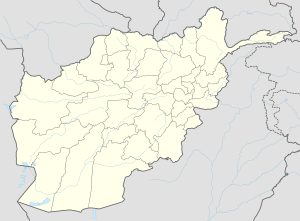
The Taliban insurgency was an insurgency that began after the group's fall from power during the 2001 War in Afghanistan. The Taliban forces fought against the Afghan government, led by President Hamid Karzai, and later by President Ashraf Ghani, and against a US-led coalition of forces that has included all members of NATO; the 2021 Taliban offensive resulted in the collapse of the government of Ashraf Ghani.

Afghanistan–India relations refers to the diplomatic relations between India and Afghanistan. They had been historical neighbours, and share cultural ties through Bollywood and cricket.

The 2008 Indian embassy bombing in Kabul was a suicide bomb terror attack on the Indian embassy in Kabul, Afghanistan on 7 July 2008 at 8:30 AM local time. The bombing killed 58 people and wounded 141. The suicide car bombing took place near the gates of the embassy during morning hours when officials enter the embassy.

Tehrik-i-Taliban Pakistan, commonly known as the Pakistani Taliban, is an umbrella organization of various Islamist armed militant groups operating along the Afghan–Pakistani border. Formed in 2007 by Baitullah Mehsud, its current leader is Noor Wali Mehsud, who has publicly pledged allegiance to the Afghan Taliban. The Pakistani Taliban share a common ideology with the Afghan Taliban and have assisted them in the 2001–2021 war, but the two groups have separate operation and command structures.
The Camp Chapman attack was a suicide attack by Humam Khalil Abu-Mulal al-Balawi against the Central Intelligence Agency facility inside Forward Operating Base Chapman on December 30, 2009. One of the main tasks of the CIA personnel stationed at the base was to provide intelligence supporting drone attacks in Pakistan. Seven American CIA officers and contractors, an officer of Jordan's intelligence service, and an Afghan working for the CIA were killed when al-Balawi detonated a bomb sewn into a vest he was wearing. Six other American CIA officers were wounded. The bombing was the most lethal attack against the CIA in more than 25 years.
The February 2010 Kabul attack on 26 February 2010 was a combined suicide bombing and shooting attack. A car bomb levelled the Arya Guesthouse, also known as the Hamid Guesthouse, popular with Indian doctors. Two armed attackers then entered the nearby Park Residence, housing other foreigners. One detonated a suicide bomb, and the other was shot dead. The Safi Landmark Hotel nearby was badly damaged by the blasts. At least 18 people were killed and 36 more were injured.
On April 5, 2010, two bombings in Pakistan killed up to 50 people and injured 100 more. In the first attack the U.S. Consulate in Peshawar was attacked by militants. The coordinated attack involved a vehicle suicide bomb and attackers who tried to enter the U.S. Consulate in Peshawar by using grenades and weapons fire. Three explosions went off within a span of 15 minutes in the area of Saddar and Hayatabad Avenue, near the American consulate and the Peshawar headquarters of Pakistan's intelligence agency. Several militants came in two vehicles. The first vehicle exploded near a security checkpoint, and gunmen in the second car opened fire. A Tehrik-i-Taliban Pakistan spokesman claimed responsibility for the assault on the consulate. In Timergara, Lower Dir district an Awami National Party rally came under attack. Pakistani Taliban spokesman Azam Tariq said "Americans are our enemies. We carried out the attack on their consulate in Peshawar. We plan more such attacks."

The Indian consulate in Herat, Afghanistan was attacked on 23 May 2014 by four heavily armed militants, three days before the inaugural ceremony of Narendra Modi as the Prime Minister of India.
The following lists events from 2014 in Afghanistan.
The following lists events that happened in 2013 in Afghanistan.
The following lists events that happened during 2016 in Afghanistan.
A group of three suicide attackers rammed a truck bomb into the wall of the German consulate in Mazar-i-Sharif, Afghanistan on 10 November 2016. Six people were killed and more than 120 others were injured, while the sole remaining attacker was captured by Afghan security forces. The Taliban claimed responsibility for the attack and Taliban spokesman Zabihullah Mujahid said the bombing was in retaliation for an airstrike in Kunduz that killed 30 civilians the week before.

The 2016 Bagram bombing took place on November 12, 2016, when a suicide bomber managed to penetrate the security layer of Bagram Airfield, the largest U.S. military base in Afghanistan located about 45 km north of Kabul, detonating his vest near a group of soldiers who were en route to Modern Army Combatives Training. Four U.S. citizens were killed (2 soldiers and 2 contractors, while at least 17 others were injured, including 16 Americans and 1 Polish citizen. One injured soldier died a month later from complications due to injuries sustained in the blast raising the total killed to 5.
The Jalalabad prison attack was a terrorist attack by Islamic State – Khorasan Province tageting a prison in Jalalabad, Afghanistan on 2 August 2020.
On 20 October 2017, suicide bombers attacked mosques in Kabul and Ghor Province, Afghanistan, killing at least 60 people.
The Embassy of India in Kabul was the diplomatic mission of the Republic of India to Afghanistan. The current Ambassador is Rudrendra Tandon.






